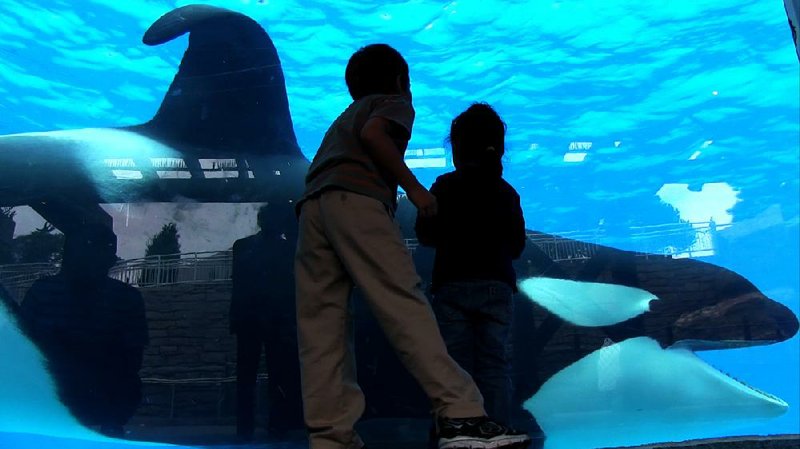In Genesis, it is written that God placed Man at the apex of the food chain, giving him “dominion over the fish of the sea, and over the fowl of the air, and over the cattle, and over all the Earth, and over every creeping thing that creepeth upon the Earth.” We have traditionally taken license to do as we will with our fellow creatures, whether that means slaughtering them for food or dressing them up for Halloween. Perhaps only a God created in our image could sanction some of the ways we exploit the vulnerable.
There are plenty of people who can’t conceive of a fish - or even an aquatic mammal, such as an orca - as anything more than a collection of meat, bone and ganglia; a dumb and narrow thing that lives to eat and reproduce. While we might allow that our domesticated pets seem to have emotional lives - capacities for joy, sorrow and grief - we are too solipsistic to grant less familiar creatures a full measure of sentience. Some of us don’t even acknowledge the pain we cause.
In the open ocean, killer whales can live to be 90 years old. They can range 100 miles in a day. They live in tightly knit family units dominated by females - males spend most of their lives by their mother’s side, leaving only to mate - and they have a complex system of social rituals.There is evidence they are capable of compassion, empathy and a sort of language. There are those who advance the possibility that, despite not having constructed a consumerist culture, they may be as intelligent as ourselves.
Gabriela Cowperthwaite’s Blackfish is a movie about a 12,000-pound killer whale called Tilikum, who was captured off the coast of Iceland in 1983 when he was about 2 years old. He has spent the past 30 years confined in concrete pools. He is chattel, the property of SeaWorld Entertainment, the corporate entity that operates and maintains 11 theme parks across the United States. During his time in captivity, Tilikum has been linked to the deaths of three humans - two trainers and a man authorities describe as a drifter, who apparently climbed into the whale’s tank after closing hours.
But Tilikum has not been destroyed, or released into the wild. He is still at SeaWorld in Orlando, Fla., where he performs and where his sperm is milked for the purposes of artificial insemination. (He’s the sire of roughly half the orcas in captivity at SeaWorld’s various parks.) He is allowed no human contact - his trainers can’t get in the water with him or massage him - but he is still a star attraction, performing in the finale of the park’s “One Ocean” show.
There is no question that Cowperthwaite and the teary parade of former orca trainers she has interviewed for this heartbreaking story believe Tilikum is a victim, an intelligent and sensitive being who has lived a life stunted by human avarice and vanity. We penned him up for our amusement, we have held him hostage in a tiny cell, we have driven him mad. Under the circumstances, Tilikum’s involvement in three human deaths might seem a mild response.
The most recent incident - and probably most widely publicized, given that it occurred in the era of YouTube and in front of a horrified crowd of spectators - occurred in February 2010 when Tilikum pulled his trainer, highly experienced 40-year old Dawn Brancheau (who had been working with orcas for 14 years), into the pool after a missed cue in a show which resulted in a withholding of Tilikum’s usual chum reward. Some have suggested that Tilikum was simply playing with his trainer and that he was unaware of the damage he could do her, but the coroner’s report makes a harrowing case that Tilikum knew exactly what he was doing.
As a film, Blackfish - the title is a reference to the Indian name for the species - is a pretty straightforward affair that relies on talking heads and archival footage. If you’ve been following the ongoing debate, you probably won’t learn much new from the film. If you haven’t, you might be staggered by the cruelty implicit in a splash show.
Unsurprisingly SeaWorld did not cooperate with Cowperthwaite, though the company has engaged a public relations firm to make sure journalists are aware that they dispute several of the film’s key points. “Though Blackfish is by most accounts a powerful, emotionally moving piece of advocacy,” their news release begins, “it is also shamefully dishonest, deliberately misleading, and scientifically inaccurate.”
Still, as one of the former SeaWorld trainers interviewed in the film suggests,it seems likely that in 20 or 50 or 100 years, we might look back and deplore our species’ willingness to enslave and torture immense beings whose hearts and minds we cannot begin to fathom.
Blackfish 87 Cast: Documentary Director: Gabriela Cowperthwaite Rating: PG-13, for for mature thematic elements including disturbing and violent images Running time: 83 minutes
MovieStyle, Pages 38 on 08/23/2013
